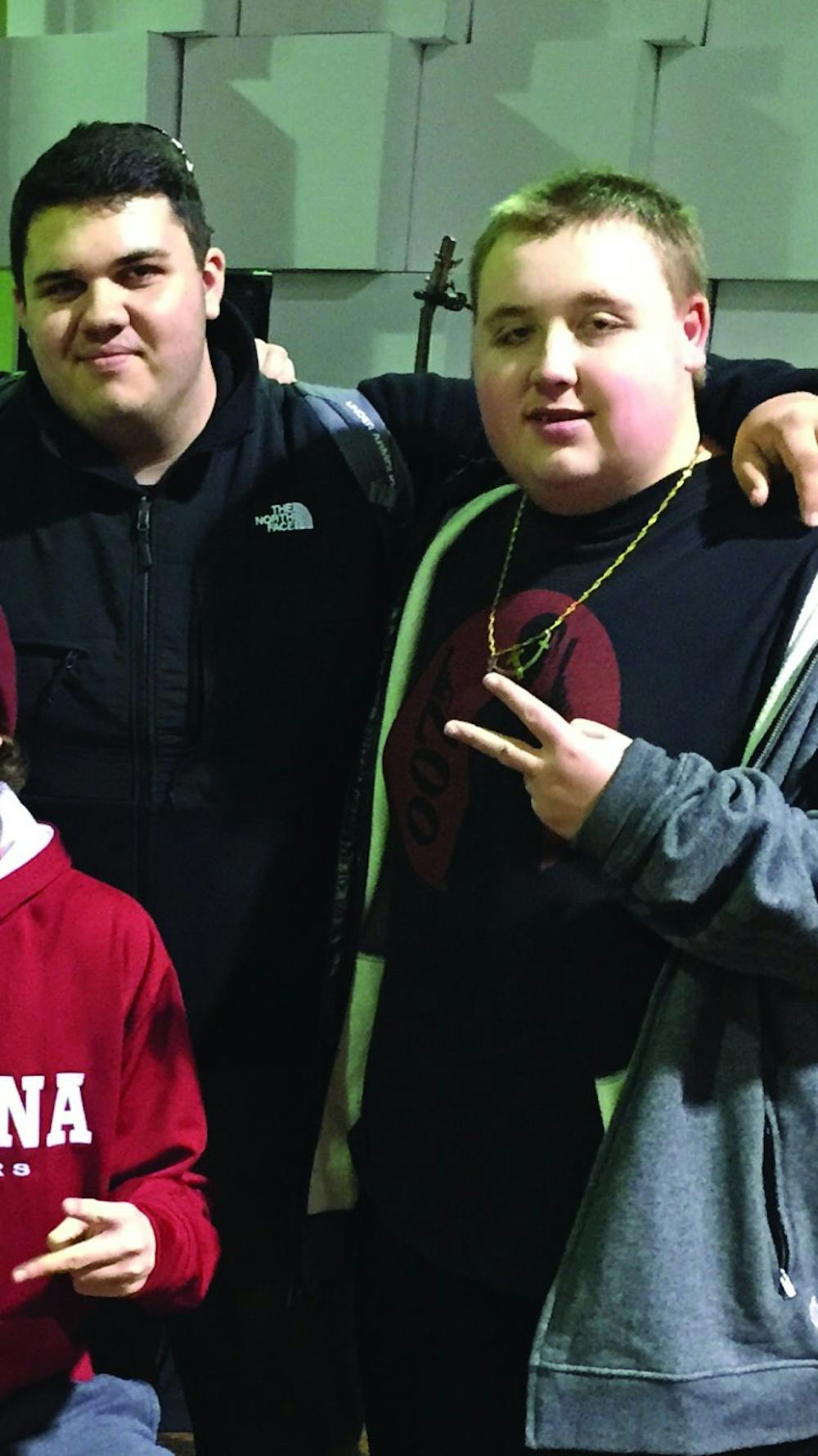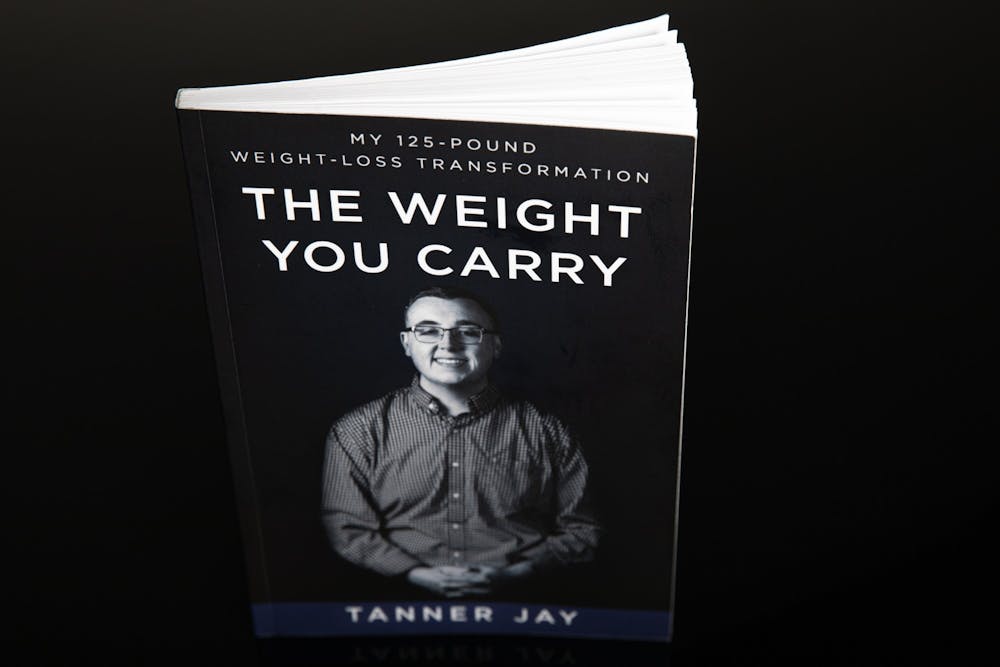Tanner Jay’s memoir, “The Weight You Carry,” is available on Amazon for $16.99 for a paperback copy or $4.99 for a Kindle e-book.
“In all reality, I have been overweight for so much of my life, it began to take a toll on my life. I hated how I felt, how I looked and how people treated me. I knew I had to reclaim my life. Along with that, I wanted to prove everyone wrong.”
When Tanner Jay graduated from Hamilton Southeastern High School in May 2016, he said, he was at his darkest place mentally.
“I was sitting at 345 pounds, finding my identity in being the funny sidekick,” Jay said. “I had never had a girlfriend, and I was in my senior year of high school. I thought I had really found the one. I simply got ghosted — she just stopped texting me, and it really just ate at me. Like, ‘This is how people treat me. Am I worthy of anything?’”
Motivated by “all the wrong reasons,” he said, Jay started his weight loss journey the summer before his freshman year at Ball State. He began going to a 24-hour gym, played basketball with his friends as a workout and changed his diet to fruit, vegetables and his go-to protein, grilled chicken — a low-calorie, healthy option he could eat until he felt full.
“It's intimidating [going to the gym] when you stick out like a sore thumb,” Jay said. “I went up to people, and I said, ‘I don’t know how to do this exercise. Can you help me?’ I think most people are genuine people who admire you for coming in and trying to improve yourself because … everyone at the gym is just trying to get better.”
By December 2017, Jay had lost 125 pounds. During his weight loss journey, he went viral on Twitter after a tweet about his weight loss received more than 86,000 impressions. People messaged him across Twitter and Instagram showing him “so much love.” Whenever he’d return to his hometown, people wouldn’t recognize him because he had lost so much weight. But, this was never enough, he said.
“I thought I was one puzzle piece away from having it all figured out,” Jay said. “I was thinking, ‘OK, if I lose this weight, that's the only thing wrong with me. I'll get the girlfriend, and life will be great.’ I got the girlfriend, and life wasn't great. I think it's important for people to realize there's so much more to life than the approval of others. If you put your identity and purpose into that, then you're going to be lost and hurt.”

To share his story about the lessons he’s learned from his weight loss journey, Jay wrote his memoir, “The Weight You Carry,” while participating in Signal Class, a program through Georgetown University. Jay found out about the program from a co-worker at his 10-week sales internship with Gartner, a research and advisory company, in Fort Myers, Florida.
As one of 180 students in the program working on their manuscripts, Jay began writing his memoir in October 2019. He wrote 10,000 words in a week before taking a month-and-a-half-long break. Writer’s block and staying motivated were challenges Jay had to overcome, he said, but once he got into his groove, he wanted to keep writing.
“Writing a book is so different than telling my story,” Jay said. “When I interact with someone, I have my elevator pitch because I’m in sales. I have to to talk quickly and explain to people what’s going on in my life. I was so used to rushing my story, but [with my memoir], I could start from the beginning. I talked about so many different aspects and stories I would never have the opportunity to tell someone in person if it were a brief interaction.”
For his memoir, Jay interviewed body builders, Division I athletes and a model to start a conversation about how individuals who are seen as fit and healthy often have the same insecurities about their bodies as Jay did.
“I’m talking to one of my friends, and she’s like, ‘I’m really insecure about my body,’ and I’m like, ‘You are a Division I track and field athlete. How are you insecure?’” Jay said. “She said, ‘I’m too muscular.’ You think that people have it figured out — [they] don't have it all figured out. I think it’s scary for a lot of people to think ‘Everyone has it figured out, but I don't.’ That’s not true at all, and that shouldn’t prohibit you from starting your journey.”
Jay also interviewed his best friend since junior high, Jona Mathioudakis, whose own weight loss journey overlapped with Jay’s.
In high school, Mathioudakis said, being someone who was big in height and stature was something a lot of his football coaches praised. But, he had multiple concussions during his final season, and his doctor told him it wasn’t safe for him to play football again. As a freshman at Indiana University Bloomington, Mathioudakis was 350 pounds, and he wasn’t in the same shape as he was when he played football.
“I had an insecurity whenever I walked into class late and would have to scoot past people,” Mathioudakis said. “I'd be afraid I’d knock into people. I’d go out of my way to make sure I was there early for class. It sucked having to buy bigger clothes. Whenever my grandparents or aunts and uncles asked for what my shirt size was, it sneakily went from an extra large to almost wearing a triple X. That was pretty embarrassing to me.”

Between November 2016 and August 2017, Mathioudakis lost 125 pounds. He didn’t initially tell anyone he was losing weight because he didn’t want to call attention to himself. When he told Jay, Mathioudakis said, he appreciated having a person on his side who was going through the same journey. Jay and Mathioudakis would play basketball together and ask each other for advice.
“I remember we’d joke like, ‘Yeah, we can't just have one big guy in the friend group,’” Mathioudakis said. “We kept each other accountable. He would send me random updates about, ‘Oh, I'm down 30 pounds.’ It’s pretty cool being able to go back and forth with somebody and talk about our struggles.”
Through Signal Class’ partnership with New Degree Press, Jay met with four different editors, a designer and a cover specialist to publish his memoir. By the end of June 2020, he had finished working with his editors, and his 124-page memoir was published July 27, 2020.
“[My editors] didn't want to take away my writing style or my voice,” Jay said. “A lot of [their edits] were big picture stuff … When I'm telling my story, I know details and aspects of everything whereas a reader might not. It was those little details. If I’m telling a story about my experience in gym class, [my editors would ask], ‘What was the weather like? What does the track look like?’”
To cover the publishing costs of his book, Jay had to raise $4,000, which he did through an IndieGoGo campaign, offering people to be a beta reader, have their name appear in his memoir’s acknowledgements and more. Amid the COVID-19 pandemic, 126 people donated to Jay's campaign, raising $5,500.
“[As] I’m reaching out to my closest friends and families, people are telling me, ‘I'd love to buy your book, but I really need to go buy hand sanitizer or toilet paper. I don't have enough money to buy food,’ and I’m like, ‘Don’t buy my book,’” Jay said. “There were so many things in my head, wondering if I'll be able to get to my $4,000 goal even before a pandemic happened. So, selling a book in a pandemic — I never expected it.”
Whenever Mathioudakis talked to Jay about “The Weight You Carry,” Mathioudakis said, he could hear the passion in Jay’s voice about sharing his story. He also believes writing a memoir gave Jay the push to keep himself in check and continue with a healthy lifestyle.
“People don't always understand the fact when you're struggling with weight, even walking in front of people makes you feel crappy about yourself,” Mathioudakis said. “Find people that are going to help hold you accountable. Find people that are going to push you to be better but will also be there [for you] because not every day is going to be rainbows and sunshine.”
Contact Nicole Thomas with comments nrthomas3@bsu.edu or on Twitter @nicolerthomas22.





